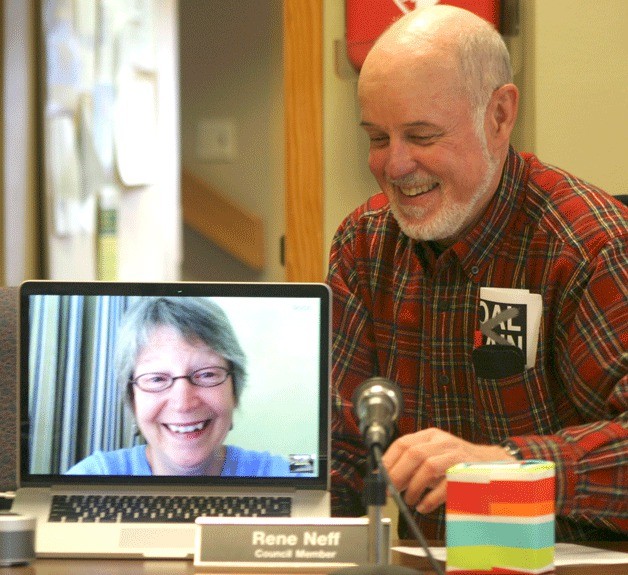City hall in Langley now features 21st century technology that could save $800 in lawyer travel time alone.
City council voted for select remote access for its meetings and other public gatherings at City Hall in April 2012. First, Langley needed the technical know-how and infrastructure.
“If we pass ordinances and something’s doable, we should just do it,” said Councilman Hal Seligson, referring to the city policy for such meetings approved last year.
“We passed this a year ago and here we are a year later with virtually no action.”
On Monday, nearly 12 months to the day after the ordinance was passed, the first digital representation of a council member was recorded in the city’s annals. Rene Neff participated from Orcas Island via Skype, though the process was far from seamless.
At one point, a private conversation Neff had off screen was overheard in City Hall.
“We haven’t even gotten to the executive session yet, this meeting is taking forever,” she said.
At other times, the connection would lag or the audio would cut in and out, chopping her speech to make her questions and comments incoherent. Several times the conversation in City Hall was recited so Neff could hear, as city staff sit too far away for their normal speaking volume to adequately cast on the laptop’s microphone.
Saving money was one reason the council considered the upgrades. Council members estimated the city could save $800 per teleconference with its legal advisors at Kenyon Disend of Issaquah. The law firm charges a traveling fee that can total about $800.
“If we can eliminate the travel part, over the course of a few visits, we’d pay for the hardware and software that made remote presence possible,” said Seligson, who donated his first year’s annual stipend of $600 back to the city for technical upgrades.
“It would really, in the long run, save the taxpayers money.”
Displaying presentations on a projector was one concern of the council. But Thomas Gill, the city’s volunteer technical advisor, said the council chambers’ new Apple TV should allow projected presentations to also be webcast.
Langley staff was tasked with testing the Apple TV system’s audio and visual capabilities before the city would announce its ability to stream meetings.
Before the meetings were broadcast in any form, Langley city officials wanted to try the technology, which could also be used for virtual meeting attendance by council members. Bringing a city council member into the room from Thailand, for example, is more complicated than using the free services of Skype, which can have connectivity issues that result in lost audio or video. External microphones used on a different software could solve those issues, Seligson said.
On the upside of digital participation, council members never have to miss a City Hall meeting again. Illness, travel and other hindrances to council duties could be removed with the addition of audio and visual remote access.
“I’m glad we’re moving into the 21st century right now,” Seligson said.
The technology allows city council members and Langley city staff to attend meetings virtually. Opening meetings to the public via the Internet through streaming services, such as those offered by Oak Harbor’s city council or the South Whidbey School District, are further away from becoming reality.
Concerns that the policy and implementation of remote access technology enables elected council members to skirt the public remain.
“I’d hope the remote council person would be able to see and hear the person, read their body language and reply in real time,” Seligson said.



